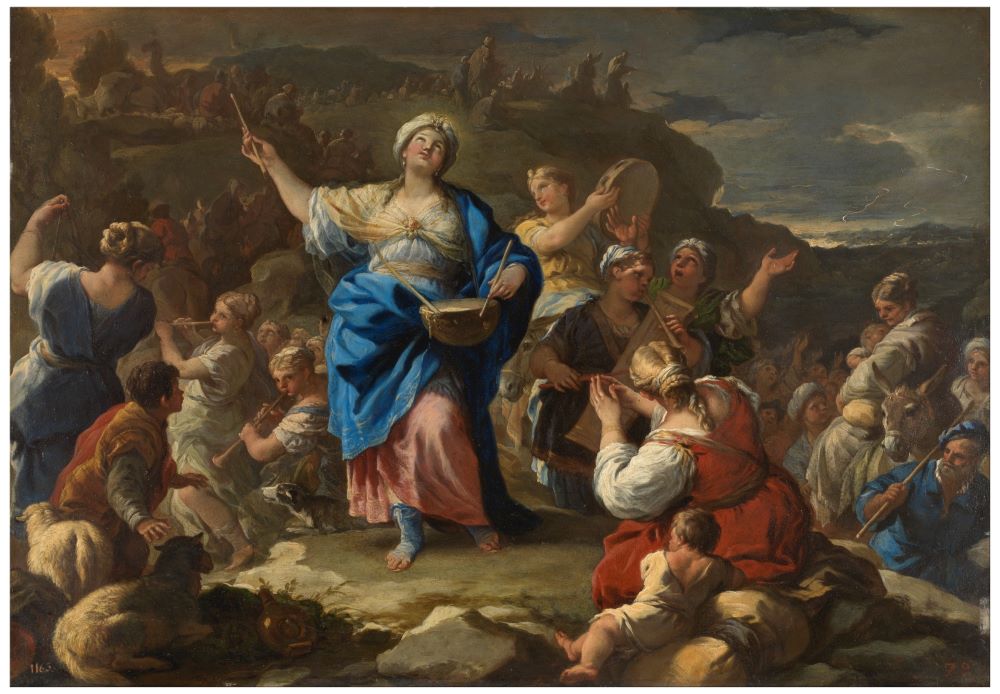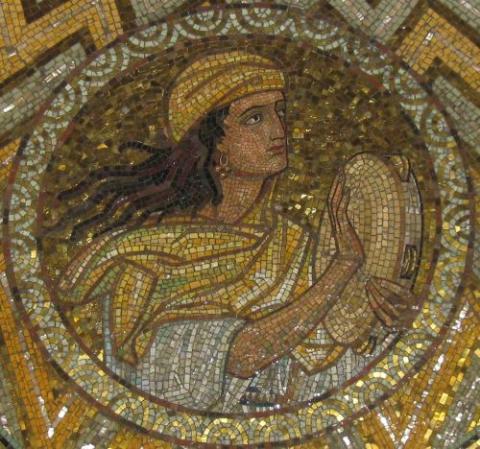
"Song of Miriam the Prophetess" by Luca Giordano (Wikimedia Commons/Museo de Prado)
"I brought you up out of Egypt and redeemed you from the land of slavery. I sent Moses to lead you, also Aaron and Miriam" (Micah 6:4).
Throughout the history of Judaism and Catholicism the roles and status of women in ancient Israel have been disputed. There are some women whose names we know well, like Eve, Sarah and Hagar in the Hebrew Scriptures and Mary, Elizabeth and Mary Magdalene in the Christian Scriptures. There are also many stories of women whose names are not mentioned, like the crippled and the adulterous women.
One woman, whose charisma and power were instrumental in the freeing of the Israelites from the land of Egypt, is mentioned only briefly by name. Despite the fact that Miriam is figured prominently in the Exodus story, her name has to a large extent been overshadowed by the story of her brothers Moses and Aaron. After all, Moses was an intimate friend of God, and Aaron was the first high priest. Compared to both her brothers, Miriam becomes only a good memory, and her leadership in the Exodus story fades away. Miriam was chosen by God to help lead the people out of Egypt, to nurture the Israelites in the desert and to become a strong, tender, joyous leader. Miriam's deep relationship with God enabled her to gradually become the leader she was meant to become.
Miriam is a foremother and an example to women, to teach us how to sing joyfully, and to nurture others when our wells run dry, when we are most vulnerable and fragile.
The first time we encounter Miriam in the Old Testament, she is still a child. Yet Miriam is essential to the history of the chosen people. Her story begins in the book of Exodus when Pharaoh, afraid of the growing population of Hebrew people, orders two Hebrew midwives to kill all the Hebrew baby boys.
One woman, Jochebed, and her daughter Miriam saved baby Moses by putting him in a basket on the Nile. In this story, we meet a young Miriam who is helping other women save their people. Miriam, although young, proves to be a strong, competent girl who watches her baby brother from her hiding place and makes sure he will be protected and cared for. Miriam also arranges for the baby to be raised by his own mother. In this way, Miriam helps to shape the future of Moses and of the chosen people. This episode shows not only a strong and competent girl, but also someone in favor of life, with the strength and determination to help her brother live in direct opposition to Pharaoh's order. She also proves to be someone clever enough to plan for the mother of the baby to become his nurse.
Later in Exodus, we find Miriam again, this time a woman, taking a place of leadership for the Hebrew women and leading them in song and dance: "Then Miriam the prophetess, Aaron's sister, took a timbrel in her hand, and all the women followed her, with timbrels and dancing" (Exodus 15:20). Miriam has retained the strengths that distinguished her from childhood and, in addition, has now taken her place alongside her brothers as a leader of the Hebrew people. The Scriptures refer to her as a prophetess, the first of a handful of women who received the title.

Miriam is pictured in tile in the Dormition Church on Mount Zion in Jerusalem (Wikimedia Commons/Radbod Commandeur)
The song of Miriam shows a self-assured woman, a free-spirited woman, who, full of the power of God, led the women in jubilant dancing and song at the victory won. Her song speaks of a woman of prayer with a close relationship with God. Miriam's leadership style, though different from that of her brothers, is needed nonetheless. The Scriptures speak very little about her, or any other prophetess for that matter, but Miriam must have been an important figure or the Scriptures would not have recorded her actions. The image of a joy-filled, ecstatic Miriam, leading other women in dance and song provides a powerful image. The story of Miriam not only empowers women as rabbis, teachers and leaders, but also as prophets, healers and midwives.
The third time we hear about Miriam is during the incident at Hazeroth, when Miriam and her brother Aaron speak against their brother Moses. Miriam and Aaron are discussing Moses' marriage to a Cushite woman, and they ask two questions: "Has the LORD spoken only through Moses?" and "Hasn't he also spoken through us?" (Numbers 12:1). This account shows an assertive Miriam with an uncanny ability to question. However, God turns Miriam's skin as white as snow.
There is a subtle chauvinism on the part of the narrator, a trace of sexism behind what appears as punishment for her questioning, but little has been said about Miriam's relationship with God. Here is a woman who is important enough for God to come down in a pillar of fire. "Then the Lord came down in a pillar of cloud; he stood at the entrance to the tent and summoned Aaron and Miriam" (Numbers 12:5). What has been perceived as punishment for gossip could very well be a consequence of Miriam's intimate encounter with God. This shows that Miriam too wears on her skin the mark of her contact with God, like her brother Moses.
One way to explain why only Miriam was afflicted and not Aaron could be that Miriam's relationship with God was more intimate. Aaron, not understanding, cries out: "Do not let her be like a stillborn infant coming from its mother's womb with its flesh half eaten away" (Numbers 12:12). Aaron clearly does not understand. The profound encounter with God changed her; however, instead of covering her face, Miriam is confined to be outside the camp for seven days until her skin returns to normal. And the people wait for her.
Later, when Miriam dies in the desert and is buried, the people are thirsty. "In the first month the whole Israelite community arrived at the Desert of Zin, and they stayed at Kadesh. There Miriam died and was buried. Now there was no water for the community, and the people gathered in opposition to Moses and Aaron" (Numbers 20:1-2). Miriam, the woman who went into the water of the Nile to rescue her brother, the woman who sang in thanksgiving and rejoicing after the parting of the Red Sea, the woman who nurtured through her presence, died, and the people were thirsty.
Advertisement
It is interesting to note that after Miriam died, the people turn against Moses and Aaron. The stability that Miriam provided is gone, and both doubted God. After her death, God provides the people with abundant water from a spring coming out of a rock in the same place where Miriam died. Miriam, at the border of the Promised Land, continues to nurture even though her mission on earth is accomplished. She served her God. She served him well.
Miriam is a foremother and an example to women, to teach us how to sing joyfully, and to nurture others when our wells run dry, when we are most vulnerable and fragile. She also teaches us how to prophesy not only in words but also in deed. Leadership demands not only words, but actions. Leadership demands courage, loyalty and the ability to question. Leadership demands an intimate relationship with God, giving the best of one's self. Even if we are overshadowed by the doubts of others, God makes our faces bright as snow! We will continue to praise him, we will continue to lead, and we will joyfully, with tambourine in hand.







